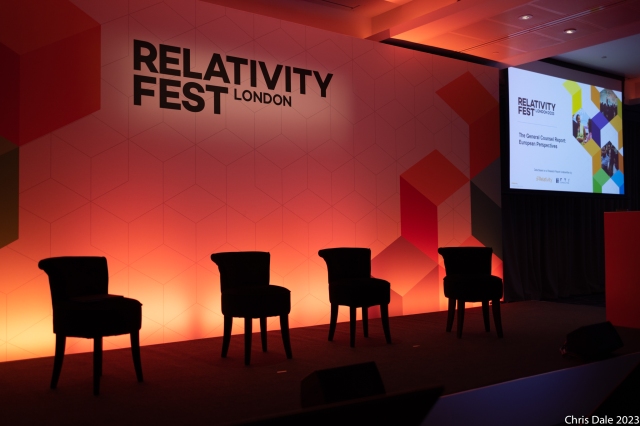This post is centred on Relativity Fest London, which took place on 16 May. Going to it – and enjoying it – made me reflect on the changes which have taken place to such events over the years. The first part of this post is about those changes.
I have been going to eDiscovery conferences since 2007. Perhaps the maddest time was a two-month period in October and November 2011, when I took part in events in Dublin, Munich, Washington, Sydney, Singapore, Berlin, and Paris, and attended another in London. I don’t remember much about the events, but two high points stick in my mind from the journeys: British Airways lost my luggage at Singapore, so that I had to do formal events in Berlin and Paris in what I stood up in plus a couple of new shirts; and I saw a cartoon about the 1958 Munich air disaster (which was caused by a snowstorm) as my plane raced down the runway at Munich in a snowstorm. It was all quite fun at the time, and good for business, but it makes me tired to look back on it now.
Then, towards the end of 2019, it all ground to a halt. A hip operation followed by Covid broke the pattern of event after event. Thereafter, even if I had been willing to sit in an airborne cylinder full of diseased people, the increasing inadequacy of airlines and airports, along with the expiry of my airline privileges, made me reluctant to go back to flying. I rather lost interest in any form of travel or gathering in shared spaces.
 All that is a long way of saying that Relativity Fest London, on 16 May, was my first eDiscovery event since the end of 2019. Events always used to mean hours of work in advance. Preparation this time involved finding a pair of dusty Loakes at the back of a cupboard and giving them a polish.
All that is a long way of saying that Relativity Fest London, on 16 May, was my first eDiscovery event since the end of 2019. Events always used to mean hours of work in advance. Preparation this time involved finding a pair of dusty Loakes at the back of a cupboard and giving them a polish.
What has changed and what has stayed the same at these big conferences? The basic format is much the same as when I started – learning sessions of some kind interspersed with breaks for food and conversation. The venues, the session formats, and the food have all changed for the better. The company names and their products have changed. The people are younger, less formally dressed, and more aware of the context – both business and human – in which they exist. The broad shape of these events, however, is recognisable to those who went to such things in 2007.
As to the venues, these events often used to take place in the basements of gloomy hotels which had seen better days. Relativity was one of those who led the move to brighter, cheerier venues such as 133 Houndsditch where Relativity Fest took place. There’s an implicit hat tip there to etc. venues for an improvement to the conference world only really appreciated by those who served time in the grim cellars of past times.
The sessions used to consist largely of speeches delivered from a podium by some worthy to a generally comatose audience, or were carefully scripted panel sessions. I hated attending them and I hated delivering them, and welcomed the move to less structured panels – discussions between informed people led by a moderator whose role is to keep the discussions flowing and, crucially, to make sure that they end on time.
In those days, there was never enough time for conversation between the sessions. I complained about this to one organiser, saying that I thought people came mainly to meet others and to talk to people, perhaps about the ideas coming out of the last session. The organisers’ answer was “We can’t sell white space to sponsors or delegates”. To old-style event marketers, the day was just a jigsaw of time slots to be sold, not an overall experience to be appreciated. When sessions overran, the whole timetable fell to pieces, and it was the breaks which got squeezed to try and bring it back on schedule. I took to leaving ostentatiously if speakers were still prattling on five minutes after the advertised end time. One of the good things of Relativity Fest London was good gaps for discussion, as well as food you might actually want to eat – one of the features of the old events was truly ghastly food and even worse coffee.
My own resolution when I started moderating panels was to loosen the structure. Everyone knew what they would be asked to talk about (mainly because my approach to preparation was to ask them what questions they wanted to answer), but I did not need to know what they would say and was content to wait and see what came up; if a difference of opinion emerged, well that was much more interesting than the old-style trudge through carefully prepared answers.
My other resolution was to be brutal about moving on when a topic had run its course or when the overall timekeeping seemed at risk. My ambition was always to end a session bang on time in fairness to the next session as well as to the audience. Perhaps the period of Zoom conferences helped improve timekeeping.
Session delegates are more representative now of the wider world. I don’t just mean “diverse” with all the baggage that brings, but we have moved on from people who all looked much the same as each other to people who look much the same as the buyers and users of the software and services under discussion, not least in the average age of the people in the room. There is a greater awareness now of the people who influence decisions rather than merely on those who make them.
One thing that has not changed is that today’s hot topic is tomorrow’s “been there, done that”. I expressed that in a tweet from the venue:
The hot topic at Relativity Fest London was, unsurprisingly, AI and its place in law and legal services.
Relativity’s press release about the event is here, its title Relativity Champions Purpose-Driven AI at Relativity Fest London giving a big clue about the day’s main theme.
There is a video of the opening keynote here.
Since I spent most of my time chatting to old friends, I am reliant (as so often) on Caroline Hill, editor-in-chief of Legal IT Insider, for an account of the day’s announcements. Her article is here. Unsurprisingly, the lead story is about AI and the two pilots being undertaken by Relativity to (as Caroline puts it) “assess opportunities going forward”. Those whose approach is to plunge into the use of AI as the ubiquitous solution to the delivery of all types of legal services got a nasty shock a few days after Relativity Fest London when a US lawyer was caught relying on ChatGPT not merely to prepare his submissions but to produce (that is, fabricate) cases to back his case. The example is an extreme one, but the whole tone of legal AI discussion changed overnight – and rightly.
Relativity’s approach of conducting pilots to assess opportunities has to be the right one. To round that off, there is a Relativity interview here called The Era of ChatGPT: What Generative AI Could Mean for the Legal World about the “remarkable advantages and perilous limitations” of generative AI.
The other big announcements were about new senior appointments. Relativity has a new EMEA leader, Georgia Foster, who becomes Managing Director and Vice President of Sales, International. Steve Couling, most recently Managing Director and Vice President of Sales, EMEA, becomes Vice President of Sales for North America. I am very pleased for Steve Couling in particular – I have known him since before he joined Relativity, and there is a special pleasure in seeing him take on a big US role.
I attended only one session, called The General Counsel Report: European Perspectives – What’s Affecting EMEA Today, Tomorrow, and Beyond. It was ably moderated by David Horrigan, Relativity’s Discovery Counsel and Legal Education Director, with a panel consisting of Karyn Harty of Dentons, Craig Earnshaw of FTI, and Alexis Alexander of Liberis.
As always when David Horrigan moderates, the discussion was lively and informative. AI played a big part in it, not because anyone wanted to ram the newest technology down our throats, but because general counsel at corporations of all sizes – always the main influencers of thought and investment – were treating AI as a priority for 2023. Relativity’s slide gave the subject the omnibus heading “Implications/risks/ethics/compliance of new technology”. This subject does not mean that security, privacy and data breaches have gone away, merely that a proper understanding of what AI could bring has been added to general counsels’ worry list.
The panel had a look back, as well, at one of the issues which dominated agendas for so long – the extent to which lawyers were willing to rely on technology (then loosely grouped under the heading “predictive coding”), to manage information in disputes, not just for discovery but for wider issues of sifting through the mass of data to find the things which actually matter.
 Karyn Harty of Dentons [pictured with David Horrigan] – someone I interviewed several times as the predictive coding subject was new and developing – said that Irish lawyers, once heavily resistant to the use of technology, now took it for granted. Karyn also repeated something I have heard her say often in discussions about privacy and data protection – that these two concepts are not the same thing.
Karyn Harty of Dentons [pictured with David Horrigan] – someone I interviewed several times as the predictive coding subject was new and developing – said that Irish lawyers, once heavily resistant to the use of technology, now took it for granted. Karyn also repeated something I have heard her say often in discussions about privacy and data protection – that these two concepts are not the same thing.
I left before the after-party – I had seen everyone I wanted to see, and it’s a long way home to Oxford. Relativity Fest London seemed to get it all right, somehow managing a packed agenda and time to chat in between sessions. Next up is Relativity Fest in Chicago, between 26 and 28 September. The website is here, and registration is open.



